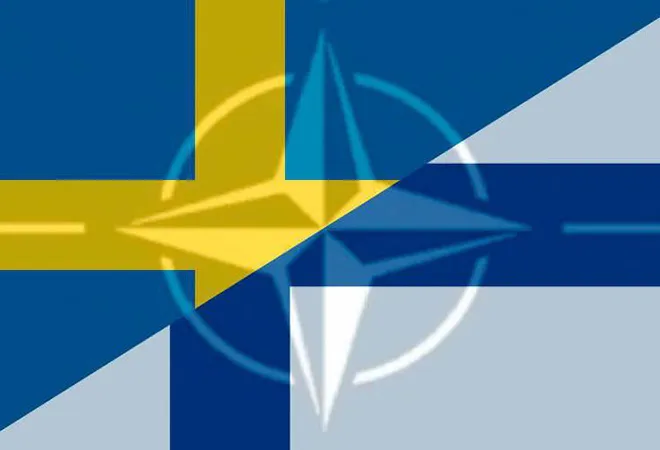
Finland and Sweden, who had recently stated their plans to join the North Atlantic Treaty Organization (NATO) without any further delay, have now formally submitted their applications for the same. The two countries, where public opinion has tilted heavily towards joining the military alliance in the wake of the Ukraine War, have historically pursued a policy of neutrality and non-alignment.
Finland had refrained from joining NATO mainly owing to a 1948 and 1992 agreement of friendship, cooperation, and mutual assistance with the erstwhile Soviet Union, whilst Sweden’s foreign policy has been focused on multilateral dialogue and nuclear disarmament, having not been a part of any military alliance for over 200 years.
However, the ongoing war in Ukraine that has admittedly alarmed Finland due to its 1,300-kilometre-long border with Russia, prompted this decision. Sweden, on the other hand, had already reintroduced conscription and boosted defence spending following the situation in Crimea in 2014, but the current war in Ukraine is believed to have provided an impetus towards this possible decision to join NATO.
President Putin has given some mixed signals by stating that although Russia “does not have problems” with this move as this does not pose any “immediate threat” to his nation, he stated that NATO’s enlargement is being utilised by the US in an “aggressive” manner to aggravate an already difficult global scenario. He also added that Russia’s reaction will be contingent on the problems that are created for them and that these problems were being created for no reason at all. If one of Russia’s aims behind the military operation in Ukraine was to stop NATO expansion eastwards, then this development would suggest the exact opposite.
President Putin has given some mixed signals by stating that although Russia “does not have problems” with this move as this does not pose any “immediate threat” to his nation, he stated that NATO’s enlargement is being utilised by the US in an “aggressive” manner to aggravate an already difficult global scenario.
Nevertheless, in a realistic sense, this change in the status of the two countries’ military alignment should not make as much difference given that both Finland and Sweden have already had a great deal of interoperability with NATO since the 1990s.
Both Finland and Sweden are NATO partners and have worked with NATO on various crucial missions in the Balkans, Afghanistan, Iraq, and Libya. The two countries also participate in hundreds of advanced exercises with NATO such as the Trident Juncture and cooperate with the western military alliance on defence, based on NATO standards. Moreover, Finland and Sweden are closely allied with the western military apparatus through their membership of the UK’s Joint Expeditionary Forces which has eight NATO members as well.
Following the outbreak of the Ukraine war too, Finland and Sweden have reportedly been sharing intelligence and coordinating their policies with NATO and their ministers have also been attending NATO ministerial meetings, which symbolises an intimate nexus with the western alliance despite not being formal members.
There seems to be immense speculation on what Russia’s reaction might be to this provocation, especially after Ukraine. However, in a sense, this move, although surely complicates the security situation in Europe further, should not elicit a violent response from Russia which already saw these countries as heavily tied to the West. The change would appear to be just on the label.
Moreover, even though the war in Ukraine teaches us a lesson that even the most seasoned international experts could get their predictions wrong, there are various other practical considerations that point toward the fact that it would be unfeasible for Russia to militarily act toward Finland and Sweden despite their recent moves.
Sweden and Finland have extremely sophisticated militaries with very strong naval forces, air force, submarines, and warplanes, paired with combat experience and defence relations with the West, which makes them a formidable opposition to take on. Whilst Russia has made a lot of gains in Ukraine since the war began, it has had to incur serious economic losses and has lost a considerable number of soldiers too (although likely to be much lesser than reported in the western and Ukrainian media). More importantly, the war continues to go on, therefore, requiring more finances as well as manpower, which makes it impossible to divert resources towards a military campaign in other parts of Europe, especially in militarily-resilient countries so closely allied with the West. Russia has already spent 1.7 trillion rubles (US$26.4 billion) on defence between January and April, which entails almost half of the 3.5 trillion rubles or 2.6 percent of the GDP, budgeted for all of 2022.
Sweden and Finland have extremely sophisticated militaries with very strong naval forces, air force, submarines, and warplanes, paired with combat experience and defence relations with the West, which makes them a formidable opposition to take on.
The West had clearly stated earlier that it would not put any boots on the ground, but would only help Ukraine militarily and through financial resources since it is not a member of NATO. However, Finland and Sweden’s NATO membership and a possible Russian aggression would mean the invocation of NATO’s Article 5, which spells out its key principle of collective defense: If any member of the alliance is attacked, it shall be considered an attack on all members. And if such an attack does occur, each member will take the actions it deems necessary to assist the ally attacked “to restore and maintain the security of the North Atlantic Area”. Therefore, Russia will have to face a full-strength western military alliance with more than 30 countries. Additionally, on the extremely unlikely chance that Russia does want to retaliate militarily, the realistic window it has is until the time that Finland and Sweden are officially members of NATO, but the West has made it very clear that the process will be fast-tracked.
Moreover, Ukraine holds historical significance for Russia which both Sweden and Finland do not. In addition to making sure that Ukraine maintains its neutral status, President Putin has clearly stated that one of Russia’s main objectives of this special military operation in Ukraine was to protect the Russian-speaking minorities in Ukraine who are believed to be subjugated by the majority in the country. Russia lacks this kind of a strong incentive, among other things, to launch an attack on a country like Finland or Sweden, which is why it could refrain from acting militarily despite its disapproval.
Being as heavily involved both militarily and economically as Russia is in a much more high-stake country like Ukraine, coupled with the fact that Sweden and Finland were officially non-aligned countries, Russia did not necessarily pose any threat to them. In fact, giving up neutrality in the context of the contemporary security situation has arguably only complicated the situation more and is likely to only antagonise Russia further.
Having said this, the military operation in Ukraine has shown that Russia’s strategic calculations do not always align with the majority view. It would not be ideal for Russia to get embroiled in another military conflict, especially with these countries that have unofficially been a part of NATO for very long. Yet, the ultimate course of action will be determined only by Putin’s strategic understanding of the matter and is thus, unpredictable.
The views expressed above belong to the author(s). ORF research and analyses now available on Telegram! Click here to access our curated content — blogs, longforms and interviews.




 PREV
PREV


